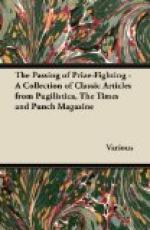NOTE BY A TRAVELLING FELLOW FIRST CLASSIC.—There’s no passage in any Classical author, Latin or Greek, so difficult as is the passage between Dover and Calais on a rough day, and yet, strange to say, the translation is comparatively easy.
* * * * *
A PICTURE ON THE LINE.—Sketch taken at the Equator.
* * * * *
QUITE A LITTLE NOVELTY.
[Illustration: Professor Ginnifer exhibiting Sims’ and Buchanan’s Monstrosities.]
DEAR MR. PUNCH,—As Englishmen are so often accused of want of originality, I hope you will let me call your attention to an occasion when it was conclusively proved that at least two of the British race were free from the reproach. The date to which I refer was the 1st of August last, when “a new and original drama,” entitled The Trumpet Call, was produced at the Royal Adelphi Theatre, and the two exceptions to the general rule then proclaimed were Messrs. GEORGE R. SIMS and ROBERT BUCHANAN, its authors. The plot of this truly new and original piece is simple in the extreme. Cuthbertson, a young gentleman, has married his wife in the belief that his Wife No. 1 (of whom he has lost sight), is dead. Having thus ceased to be a widower, Cuthbertson is confronted by Wife No. 1 and deserts Wife No. 2. Assured by the villain of the piece that she is not really married to Cuthbertson, Wife No. 2 prepares to marry her informant. The nuptials are about to be celebrated in the Chapel Royal, Savoy, when enter Wife No. 1 who explains that she was a married woman when she met Cuthbertson, and therefore, a fair, or rather unfair, bigamist. Upon this Cuthbertson (who is conveniently near in a pew, wearing the unpretentious uniform of the Royal Horse Artillery), rushes into the arms of the lady who has erroneously been numbered Wife No. 2, when she has been in reality Wife No. 1, and all is joy. Now I need scarcely point out to you that nothing like this has ever been seen on the stage before. It is a marvel to me how Messrs. SIMS and BUCHANAN came to think of such clever things.
[Illustration: An Altared Scene.]
But if it had been only the plot that was original, I should not have been so anxious to direct attention to The Trumpet Call. But the incidents and characters are equally novel. For instance, unlike The Lights o’ London, there is a caravan and a showman. Next, unlike In the Ranks, there are scenes of barrack-life that are full of freshness and originality. In Harbour Lights, if my memory does not play me false, the hero enlisted in the Guards, in The Trumpet Call he joins the Royal Horse Artillery. Then, again, unlike the scene in the New Cut in The Lights o’ London, there is a view by night of the exterior of the Mogul Music Hall. Further, there is a “Doss House” scene, that did not for a moment (or




